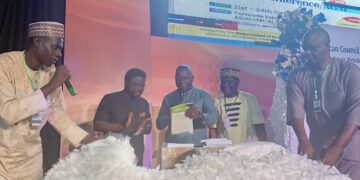By Cletus Asuquo
The African Council for Communication Education (ACCE), Nigeria chapter, has opened it 26th Annual International conference and Annual General meeting in Calabar, Cross River State.
The ACCE draws global communication scholars, researchers, as well as media practitioners to deliberate on the role of indigenous knowledge in the era of artificial intelligence (AI) and big data.
The three-day event, held at the Dome, Marian Road, brought together experts from across Nigeria and other African countries under the theme: “Communication and Indigenous Knowledge Systems in the Era of AI, Big Data and Cultural Transformation.”
Declaring the conference open on behalf of Governor Bassey Edet Otu, the Cross River State Commissioner for Education, Prof. Stephen Odey, said the state was proud to host a gathering of intellectuals whose work aligns with the government’s commitment to data-driven and knowledge-based education.
According to him, the theme resonates with the state’s efforts to integrate artificial intelligence and data analytics into the education sector.
“Without adequate data, we cannot have effective planning. That is why this conversation on communication and indigenous knowledge is timely,” Odey said, pledging the government’s willingness to adopt useful recommendations from the conference proceedings.
In his welcome address, the President of ACCE Nigeria, Prof. Abdullahi Bashir, urged African scholars and communicators to revive and strengthen indigenous knowledge systems as viable tools for development and cultural identity. He lamented that communication scholarship in Africa is still heavily influenced by Western ideas and frameworks, calling for “a renaissance that restores balance between global knowledge and African wisdom.”
Prof. Bashir revealed that the council received close to 200 abstracts from universities across Nigeria and neighbouring countries, describing the turnout as a reflection of the growing interest in African-centered communication studies.
He expressed solidarity with university lecturers engaged in industrial action, urging both government and unions to embrace traditional negotiation approaches rooted in indigenous values.
Representing the Vice Chancellor of the University of Calabar, Prof. Tony Inyang, Deputy Vice Chancellor (Academics), commended the ACCE for choosing the institution as host, noting that the conference complements the university’s 50th-anniversary celebrations. He described communication as “the lifeblood of human progress” and urged scholars to use modern technology to project African culture rather than erode it.
Similarly, in his keynote address Prof. Abiodun Salawu from South Africa, emphasized the critical role of African indigenous languages in preserving knowledge and identity. He called for greater inclusion of local languages in media, research, and education as a means of countering cultural loss in the digital age.
The conference, hosted in collaboration with the Faculty of Communication and Media Studies, University of Calabar, is expected to produce policy papers and scholarly recommendations aimed at integrating indigenous knowledge into contemporary communication practices across Africa.












